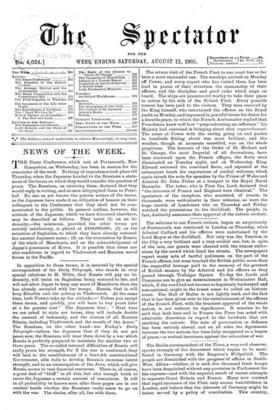In opposition to these terms, it is asserted by the
special correspondent of the Daily Telegraph, who stands in very special relations to M. Witte, that Russia will pay no in- demnity, will insist on Saghalien being restored to her, and will not allow Japan to keep any more of Manchuria than she has already occupied with her troops. Russia, that is, will keep Kharbin and the railway to Vladivostok. At the same time, both Powers take up the attitude,—" Unless you accept these terms, and quickly, you will have to buy peace later at a far greater cost." The Japanese hint : "Next time we are asked to state our terms, they will include double the amount of indemnity, and the cession of all Eastern Siberia, including Vladivostok and the mouth of the Amur." The Russians, on the other hand—see Friday's Daily Telegraph—inform the Japanese that if they do not get peace now, the Russians will wear them down by a war which Russia is perfectly prepared to maintain for another two or three years. The so-called internal difficulties of Russia will really prove her strength, for if the war is continued, they will lead to the establishment of a bond-fide constitutional Government, able fully to develop Russia's immense latent strength, and to an emancipation of the Jews, which will give Russia access to vast financial resources. There is, of course, a great deal of " bluff " in all this, but also enough truth to cause the Japanese a certain amount of uneasiness. It will in all probability be known soon after these pages are in our readers' bands whether the Russians really mean to go on ;with the war. The choice, after all, lies with them. The return visit of the French Fleet to our coast has so far been a most successful one. The warships arrived on Monday off Cowes, and every expert who has visited them has been loud in praise of their structure, the seamanship of their officers, and the discipline and good order which reign on board. The ships are pronounced worthy to take their place in action by the side of the British Fleet. Every possible honour has been paid to the visitors. They were received by the King himself, who entertained the officers on the Royal yacht on Monday, and expressed in graceful terms his desire for a durable peace, to which the French Ambassador replied that Frenchmen knew well how "preponderating an influence" his Majesty had exercised in bringing about that rapprochement. The scene at Cowes with the racing going on and yachts in hundreds flitting about was most brilliant, and the weather, though at moments unsettled, was on the whole propitious. The honours of the Order of St. Michael and St. George, the most Imperial of all decorations, have been showered upon the French offiiers, the fleets were illuminated on Tuesday night, and on Wednesday King Edward reviewed the combined fleets, and repeated at the subsequent lunch his expressions of cordial welcome, which again struck the note for speeches by the Prince of Wales and Admiral Sir John Fisher at a banquet in the Royal Naval Barracks. The latter, who is First Sea Lord, declared that "the interests of France and England were identical." The spectators of the reception, who mustered, of course, in thousands, were enthusiastic in their welcome, as were the huge crowds of Londoners who on Thursday and Friday watched the processions to the Guildhall. The people, in fact, distinctly announce their approval of the entente cordiale.


































